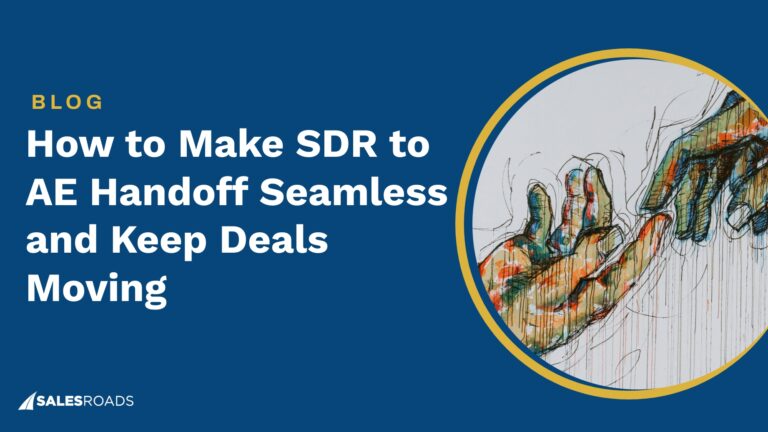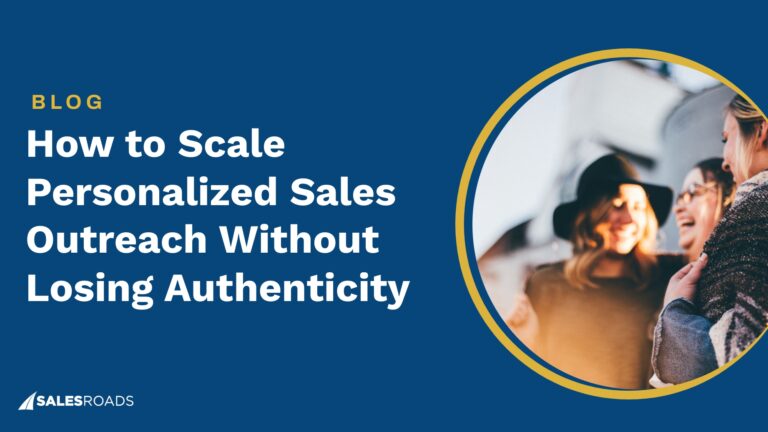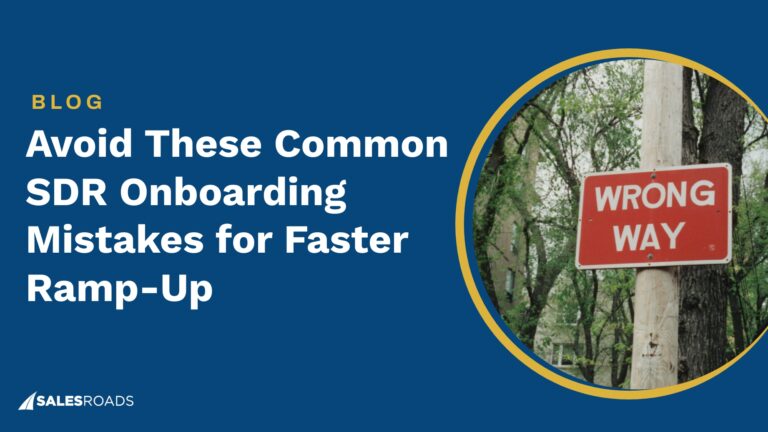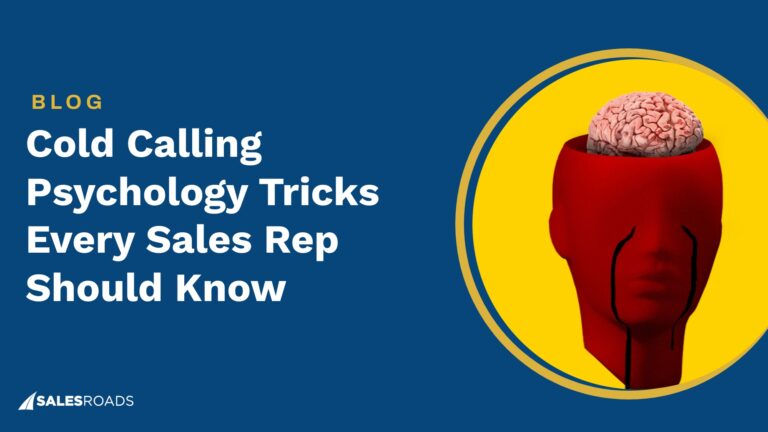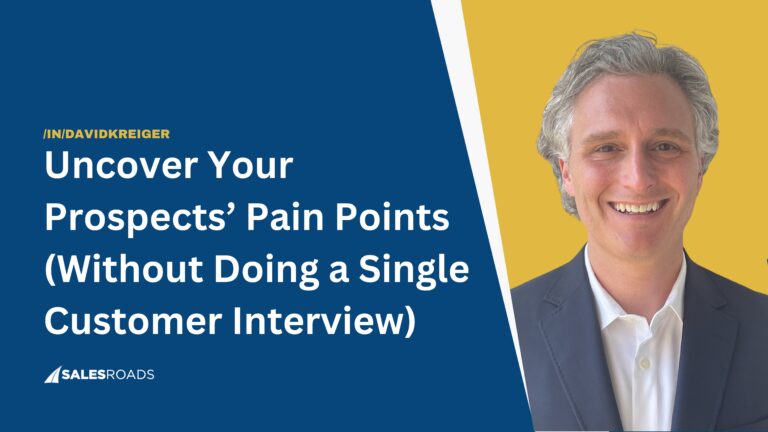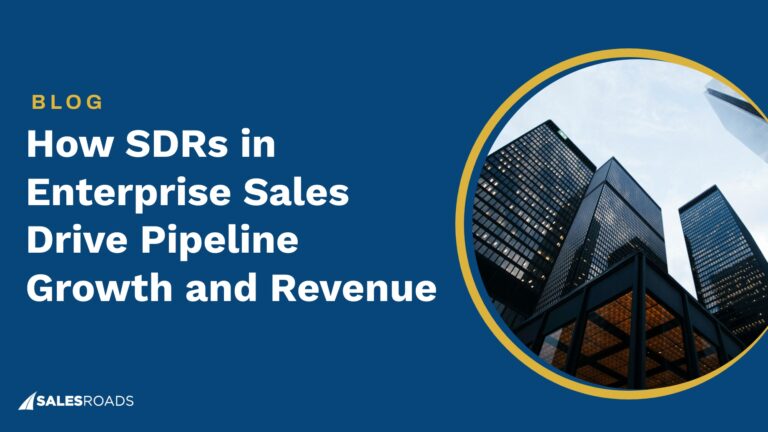Sell Like A Leader – Episode 23
In this episode, we dive into:
– Innovation and trust in sales teams: Focusing on picking mature impactful ideas for execution, building a successful team by having the right people in the right seats, the importance of two-way trust in team settings, the value of transparent feedback in a team setting, and its impact on team dynamics, creating feedback loops for continuous improvement, how to maintain consistent accountability, using customized quizzes and tailored conversations for more effective lead engagement, deeply understanding client pain points with standardized assessments and the importance of prospecting opportunities to help others beyond just making a sale.
– Rapid Fire Q&A
About Maxwell Nee
David Kreiger chats with Maxwell Nee, the Chief Revenue Officer of ScoreApp, a Quiz Marketing Platform with 7,000 paying clients. He’s also a multi-award-winning entrepreneur, bodybuilder & dancer and has been featured in TV, Radio, Forbes, Singapore’s The Business Times & The Australian Business Review.
Podcast Key Takeaways
- Maxwell emphasizes the importance of not just coming up with innovative ideas, but also the discipline required to select and focus on mature ideas that have clear potential outcomes.
- He discusses the criticality of having the right people in the right roles within a business. If not all team members are optimal, he suggests walking away rather than trying to force success.
- Maxwell highlights the importance of a transparent feedback culture where learning is shared openly within the team, akin to a military-grade approach. Even the CEO should be open to feedback.
- Trust within a team is built through shared experiences, whether in success or failure. Maxwell describes practices like circles of appreciation and direct feedback sessions to build this trust.
Connects
Connect with Maxwell Nee: https://www.linkedin.com/in/maxwellnee/
Connect with David Kreiger: https://www.linkedin.com/in/davidkreiger
Subscribe to the podcast and follow our Podcast LinkedIn page so you don’t miss any episodes!
Transcript
David: Welcome back to another episode of the Sell Like a Leader podcast, the podcast for revenue leaders who are on a mission to cultivate a high-performing sales team. I'm your host, David Kreiger, founder of SalesRoads, America's most trusted sales outsourcing and appointment setting firm.
Today, we bring you another great revenue leader, Maxwell Nee.
He is the CRO, the Chief Revenue Officer, of ScoreApp, which, if you have not seen, is a really cool app for lead generation. It's basically creating marketing quizzes to be able to attract new leads for you guys. I just checked it out—I think you should too. So, they have 000 clients right now. And not only that, he's a multi-award-winning entrepreneur.
And I just mentioned this to him—I don't think I've ever had a bodybuilder on the Sell Like a Leader podcast, as well as a dancer. And he's been featured in [00:01:00] TV, radio, Forbes, Singapore's The Business Times, and the Australian Business Review. So let's get started. Thank you so much, Maxwell, for being on the show.
Maxwell: Yes, thank you so much for having me.
David: So you are a serial entrepreneur, and you have created a lot of different innovative strategies at your companies. And so I'd love to dive into just getting a sense for—how do you come up with new ideas? How do you think about innovation, not just for yourself, but how do you foster that in your team?
Maxwell: Wow. Yeah, good question. So new ideas—my problem is picking the mature ones and picking the ones to put focus and time into, so I've got to put a lot of discipline into that. I think for anyone, new ideas are everywhere.
But there's certain boxes I think that you want to have ticked before you pursue anything. It's very cliché, but you want to be a bit like a pilot where you only take [00:02:00] off when you know where you're landing. I want to be able to see that landing strip.
And what that could be is, like, for example, I want to—I want an entrepreneurial job that might add maybe like an extra 200k a year to my income, like me personally. And then I want this business to be growing in enterprise value so that it could be sold. Not necessarily, I want to sell everything, but it never hurts to have because some businesses are optimized to be sold for a big number, some aren't.
And why not play that game where you're building that pyramid brick by brick in the background, just in case. So those are the main things I would look for at a high level.
David: Sounds like you're lucky—lots of ideas come to you. And so it seems like you do put, from what you just said, more focus on trying to curate those ideas. If I'm understanding correctly, you're really thinking about the end in mind and figuring out which ideas can take you there.
And as you're thinking about that and you have [00:03:00] people on your team, do you foster just an overall culture of innovation and coming up with new ideas? Or do you really think about more focusing them on execution and creating those ideas and leaving the innovation to you?
Maxwell: Yeah, 100. Like, a complete business won't even get off the ground without the right people in the right seats. You know, I always see it as, there's at least probably four people that I want to have in a business.
So imagine it like a really tight basketball team. And if you only have three, you only have two— if you have four, they're not necessarily all A players, and there's two B players in there, and you're trying to just cover the gaps—then I'll walk away. I've learned to just walk away unless I've got all the cards in my hand that I exactly want.
Because I've gone through it the other way where I didn't know at the time, but I was forcing things and rushing things and trying to make do with what I had available [00:04:00] to me.
And that journey, compared to when you've got the right people in the right seats, it's like miles apart—like, miles apart. Like you're either winning the gold medal or you're fighting every day. It's just the way that the rhythm rolls is so different. And I decided that I don't want to put an ounce of time or energy into what's not optimal anymore.
David: And to that end, I'd love to get your thoughts on building a high-performing sales team and building that team around you. You're currently building ScoreApp. You had a coaching business before that.
Are there any specific lessons that you've learned in building that core team, whether it's those core three people around you or the other people in your sales organization, that have helped you in your entrepreneurial journey?
Maxwell: Yeah, yeah. My last business, with those three of us on the core team, we built an enormous
inner circle. And then, as the team grew, like a bigger inner circle of [00:05:00] real two-way trust and mutual respect, and professionalism towards goals. So what I mean by that is—we didn't have the typical, like what you have in corporate jobs: I want to give you feedback, but I'm going to take you aside to a 1:1, I'm going to give it to you in a very vague way that I hope doesn't offend you. And then you may or may not get it.
And I'm only going to give it to you 1:1. In our business, feedback is learning, and learning should be shared. And there was enough—the foundation of trust and mutual respect was high enough that anyone could get feedback in front of everyone else.
When—say, Friday Zoom call with the team—and if someone had dropped the ball on something or there was something that could have been improved, we'd say, hey look, let's—I noticed this thing, whose responsibility is that? It was [00:06:00] Andrew's. Okay, Andrew, what happened here?
And then they said, Oh yeah, so we dropped the ball. I said, okay, when that happens, did you know that there's this gap in the business? It's—I didn't know that, I didn't know it was that important. Sometimes you have something really that simple.
And then, so we would give that in front of everyone every single time. And because of that, not one person is learning—the team at the time was 23 people—23 people were learning, right? And then 23 people didn't have to—what happens if Andrew's sick and someone takes his job and they make the same mistake?
Then the next person knows, okay, this is a really important thing to not drop the ball on, type of thing.
So I didn't know how effective and powerful that was in a bigger organization—what I just said—until I heard Jensen Huang, the CEO of NVIDIA—he does it as well. So in his business, he's the CEO of the second-largest company on the planet, a larger market cap than Germany, [00:07:00] and he has 62 direct reports. Most CEOs have 5, 10, 20. He has more than three times the amount of direct reports.
And so he's got a very flat-line leadership structure. That's what we had as well. And in his flat-line leadership structure, he has the same thing. He has Zoom calls—everyone's on there. If he's going to give someone feedback, 61 people are listening every single time.
He doesn't believe in one-on-ones. He doesn't believe in hiding things. He doesn't believe in compartmentalizing the team, especially from a feedback perspective. He believes in transparency. He believes in authenticity. And he believes that transparency and authenticity, as long as the feedback was delivered in that way, then it's delivered in a way that's respectful, and we're all here about achieving the goal.
We're not here about personally attacking you.
David: That's interesting. And I have heard Jensen talk about that. I haven't heard other people adopting the strategy. And so you talked a little bit about—to do that, you had [00:08:00] to build trust amongst the team.
Can you tell me a little bit about that? Like, how do you build that type of trust so that you can call them out—you said in a respectful way—you still are putting people on the spot, everybody else is learning. I can see the benefit. I also can see people feeling it, which can be good or bad. What are your thoughts on all that?
Maxwell: So trust is a two-way street, right? So if you give it, you gotta take it. If you win together, you gotta lose together. If you win, you can't take all the credit. If you lose, you gotta share the credit, right?
So in the Army, they build trust by going through the trenches together. They go through boot camps, they struggle together, they win together.
And that creates a bond—and I've seen you inside out, you've seen me inside out. There's nothing left. There's nothing left to want to hide from each other. We didn’t go through the Army together, but we went through almost a military grade of feedback together.
So [00:09:00] every quarter we would meet in person where we could—this was during, half of it was during COVID—we’d meet in person, and then we would do a
circle of appreciation. First we’d do a circle of acknowledgement.
So there’d be four or five people in the senior leadership team. We’d all go around in a circle and say, hey, what do we acknowledge each other for over the last quarter? Great. Okay. Now, what do we appreciate in each one of us that we’ve all done really well, right?
So four people—everyone will get three appreciations from other people. And then the last one is okay. What's a very direct piece of feedback that one person can do better. So that one person is then getting 3, 4, as a team grew, 10, 23 pieces of feedback, and they could have all been the same. They need to hear it from each person, and each person needs to give one, and each person needs to take one.
And as you just keep doing that, [00:10:00] Yeah, it's uncomfortable the first time. It's uncomfortable for me as well, especially if you're a personality that's, um, that avoids conflict, right? You might have had a lot of conflict in your home when you were young, so you avoid conflict, but that doesn't work.
I either want to improve that and coach through it, or I'll just say, this job isn't for you. Because, if if I can't help you improve, and if you can't take improvement from me, then what's the point? They're like what are we doing here? We're not here to give each other more buzzy feelings.
I'm here to make you money and put money in your bank account from high performance in this team.
David: That's great. So I wish it cures just a little bit. And I love to talk a little bit about personalized outreach. I think what you guys are doing is you're giving sales teams some really cool tools to be able to do some personalized [00:11:00] outreach and have data about their prospects.
So can you talk to me a little bit about how you're training or coaching your team to have personalized, tailored conversations when they're contacting?
Maxwell: ScoreApp is a quiz marketing tool. And what that means is that it allows a prospect to get a high piece of value, a piece of two-way value by filling out an assessment. So they fill out an assessment and then they get like a personalized report.
That's a survey that has results personalized to that. So I'll give you an example.
The way that you might use this in lead generation is you might have gone to a gym or you might have seen an ad for a personal trainer and it might say something like, fill out these 10 questions and find out your exact body type and based on your exact body type, your frame, small, medium or large, we will recommend for you the exact nutrition and workout plans to help you achieve your summer goals in up to 50 percent faster, and [00:12:00] that's really compelling for a few reasons.
It's compelling because it's something that is personalized in that my results different to yours. Yours different to mine. I get a score. You get a score. It's also compelling because it's instant; it's often when things are personalized, they're not instant.
So you add those two together, and that's really quite compelling. And then emotionally, it's quite compelling because it like tickles a little bit of ego. It's oh, I wonder what mine is. Everyone, as much as they don't want to, how people might not want to say, people are, they care about their own identity.
I care about myself and I care about how I'm different to other people. I care about, and I want to validate that, so you're validating me that I'm not like everyone else. So I get special treatment. In terms of how to achieve my goals. Imagine giving that to every single prospect and then taking them through that in that, in that sales [00:13:00] process.
I'll give you another example of someone that uses it just for sales, not for lead generation, but just for sales. There was someone I used to do digital marketing for — gyms in Australia — and the average gym would make about two million bucks a year, which is quite a lot of money back then for a gym.
And then all of a sudden there was this one gym that I found through a friend and they were making eight million bucks a year. I was like, wow, what are you guys doing differently? Like you're charging more and you're getting more people to work with you and next door people are earning 75 percent less.
Right. They bought one of those body scanning things where it scans like your body mass index, but more importantly, it scans like your internals. So scans what's known as like your visceral fat. And they'd have a sign saying this free body scanner — come into the gym and then scan it and it will take you through it. It's usually a $100 appointment, but they will give it to you for free. So they would come in and get everyone scanned, like busy [00:14:00] corporate workers.
So, oh yeah, cool. $100 appointment free. Why not? And then they have a scan of the visceral body fat thing. And then everyone is like a 7, 8, 9 or 10 out of 10 of really bad.
And when you have the personal trainer, the owner of the gym sit down and explain that to you — this is really bad. This leads to diabetes, leads to hair loss, leads to this, leads to that, leads to this. All of a sudden the urgency for taking your health more seriously goes from sometime in the horizon to right up in front of your face, right?
The urgency comes right up in front of you. And then I said, what's your close rate when you take people through that process? He's about, about 98%.
David: Wow.
Maxwell: Percent, charging four times more.
David: That's a great story. I think there's a lot in there. And so as people are trying to create, maybe quizzes to your app, or just use those types of principles that you learn, are there certain tips that [00:15:00] you would give people to create those types of discoveries for people that not only make people realize, you know what their pain is, but also give your sales team a sense of what some of those things might be so that they can have those types of conversations with the prospect?
Maxwell: Yeah, so what I would say is just think about it as a standardized tool that you use with everyone, and then that will add some level of standardized efficiency results to everyone that you work with. It's no different to a needs analysis that a doctor puts you through.
So all it does is that it's a doctor saying to you, are you sick? Yes. What's wrong? Uh, well, my throat hurts. My eyes hurt. I'm tired. I'm sleeping. My throat's dry. So they're ticking off symptoms to then pinpoint an exact problem, right?
So whether or not all your clients have the same problem, or they have different problems, and you want to recommend different products or the same products, just taking someone through that process where they feel [00:16:00] really heard and understood is like 90 percent of the magic in the sales process.
And the fact that you might be taking everyone through the exact same questions. It's amazing. You don't want it to be customized, because everyone should get the same service. And if you find what really works, then that means it puts less reliance on the salesperson being a good salesperson and just more reliant on the process.
David: Curious. Are you training and coaching your sales team to use AI? And if so, how have you found it to be effective or maybe not effective?
Maxwell: I haven't really looked into AI yet, to be honest. I'm sure it's in the tools that we use all over the place, like in ScoreApp. You can use AI to write a whole marketing campaign for you. It writes about six, seven hours of marketing copy for you. So we're using it there, but not really using it in sales yet.
David: And lastly, going the other direction, going more old school, one thing that we saw that you promote, at least you thought was good in 2024, was direct mail. Why do you think that was? And do you see that [00:17:00] trend continuing?
Maxwell: I think direct mail is amazing. I think that the more that you're contrarian to what other people are used to, the louder you are, right? In my last business, we used to do live workshops, where we would coach people on the spot, like 200 people in the room. And if we got it right, we got it really right.
If we got it wrong, we got it wrong. Really wrong. So it's a bit like how you go to a Tony Robbins concert and then he'll coach one person live and take him out of depression in four minutes in front of 2,000 people. So we would do our version of that.
So A) being different to everyone else is outstanding. And B) you know, direct mail — people would never not appreciate something that they know has taken more time for them to receive. You know, if someone receives a handwritten letter, it's not the letter, it's not receiving the mail that's special, it's the fact that in the back of your head, that this takes a lot more time, care, and attention [00:18:00] than receiving an email.
David: I love it. With that, I want to move to the last part of our show, which is rapid-fire questions. So I'm gonna ask you a few questions I ask all my guests and would love to get your perspective on it. So first is: what is one thing that people don't give enough value or attention to in leadership?
Maxwell: I think they don't give enough attention to the right person in the right spot in the first place. Because no one likes to lose, everyone likes to win, and if someone's not winning, then you gotta ask that hard question right at the top of the list.
David: What is one skill you advise everyone in sales to master?
Maxwell: It would be prospecting, but not just prospecting for sales, but prospecting for opportunities to help someone within any conversation. Especially if you can't sell something — if someone says, “Don't budge to buy a thing.
Right now I've got to go because I need to go find a new car, I'm looking at Tesla,” if you happen to know that Tesla's got a discount [00:19:00] and you could give them a discount code, then give it to them. Find ways to delight people out in and around and outside what you know — what you're selling.
David: What's your favorite business, leadership, or sales book?
Maxwell: I don't know if I have one, but let me share with you an ethos that I really love. So, you know Warren Buffett talks a lot about human nature, and he talks about how if you have the incentives right in a business and you have the accountability right, then human nature will dictate that — just like gravity — the water will fall on the waterfall exactly where you want it to fall.
All the droplets will just fall in the right place. So I think that a lot of what's missing, or what's right or wrong, is incentives and accountability. I think that if there's — for example, if a salesperson's doing really well and they get a little bit of favoritism, [00:20:00] that's very toxic.
Everyone should be just as accountable. And I think that the owner of the business should also remember they're also accountable to the clients, because the clients are the ultimate owners of the business type of thing. So that's what I'd say.
David: What's your favorite quote, mantra, or saying that inspires you as a leader?
Maxwell: By Abe Lincoln, which is: "If I had nine hours to cut down a tree, I'd spend six hours sharpening my axe."
David: And then lastly, just curious — what's the most important goal or project that you're working on right now?
Maxwell: I'm working on a lot, but one that's getting really exciting, picking up speed, is I have a renewable energy company. So we're building wind turbines for people to put anywhere — so not just on top of towers, but also they'll hang off street lights.
And when a car drives past, it'll spin, and then it'll power the streetlight type of thing.
So yeah, that's really cool because [00:21:00] obviously electricity's perpetual, and if you get into the business of selling electricity — even though we're not selling to the grid, we're selling off-grid — that's a very exciting business model.
David: Very cool. Awesome. Maxwell, really appreciate the insights that you brought today. And if folks want to connect with you, learn more about ScoreApp, how do they find you guys?
Maxwell: Yeah. Let me give you a freebie. So we have a freebie, which is the book that my business partner wrote. It's called Scorecard Marketing. If you go to ScoreApp — S-C-O-R-E-A-P-P dot com slash book — that will be where you can get a free copy. Physical, if not PDF. And you can then join as a free user and we can show you what we can do.
David: That's great. Thank you, Maxwell. And thank you listeners for joining another episode of the Sell Like a Leader podcast. I'm David Kreiger. I'm on LinkedIn — hit me up if you have any questions or guests you want to hear from. Until next time, thanks so much.
Thanks, Maxwell.


